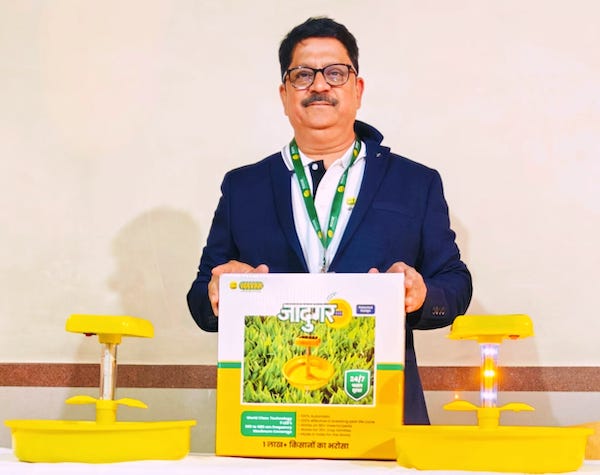Business
Wavar Co-founders Sanjay Shirodkar and Joy. C on Creating India’s Largest IPM-Focused Agritech Success Story
Published
1 month agoon

In a detailed conversation with Wavar Co-founders Sanjay Shirodkar and Joy C, we explore how this forward-thinking agritech company is reshaping the Indian agricultural landscape. With a focus on Integrated Pest Management (IPM), Wavar is empowering farmers with innovative, cost-effective, and sustainable solutions. The company’s flagship product, Wavar Jadugar, is already making a significant impact, helping farmers reduce costs, improve yields, and adopt environmentally friendly practices.
As Wavar prepares for its next phase of growth, the co-founders share their journey, vision, and strategies that continue to drive their success.
Excerpts from the interview with our special correspondent are below:
1. Can you tell us about the inspiration behind founding Wavar? What problem in Indian agriculture were you aiming to solve?
Wavar was founded with a singular focus—to address the persistent challenges farmers face in pest management. While agriculture has witnessed technological advancements in irrigation, fertilizers, and equipment, pest management remains deeply reliant on chemical-heavy solutions that are neither cost-effective nor environmentally friendly. We recognized this as an opportunity to introduce sustainable, technology-driven solutions that empower farmers to not only protect their crops but also reduce operational costs and improve yields.
2. Wavar has seen impressive growth since its inception. Could you walk us through some key milestones achieved so far?
Since our inception, Wavar has been on a focused journey of impact and growth. Some key milestones include launching our flagship product Wavar Jadugar, and establishing a presence across eight states through partnerships with over 50 Farmer Producer Organizations (FPOs). By the end of FY24, we achieved an impressive 10X growth and closed the financial year profitably. Additionally, we’ve impacted over 250,000 farmers across 65 regions—a testament to the tangible difference Wavar is making in Indian agriculture.
3. Sustainability seems to be a core pillar of Wavar’s approach. How do you see technology bridging the gap between traditional farming practices and sustainable agriculture?
At Wavar, technology is not just a product—it’s an enabler. Our focus has always been on integrating technology seamlessly into traditional farming practices rather than disrupting them. From leveraging digital tools for sales, marketing, and content dissemination to ensuring that our flagship product Wavar Jadugar operates autonomously and efficiently, we use technology to simplify processes, drive efficiency, and deliver measurable results.
4. Wavar’s flagship product, Jadugar, has been gaining significant traction. What makes it unique in the crowded agritech market?
What sets Wavar Jadugar apart is its ability to address pest management challenges holistically. Unlike traditional methods, Jadugar operates autonomously during the critical evening hours when pest activity peaks, ensuring maximum efficiency. Being entirely powered by solar energy makes it environmentally friendly and minimizes operational costs for farmers. Additionally, Jadugar’s versatility—it works across over 80 pest species and 30+ crop families—makes it a game-changer for diverse farming needs.
5. How has the adoption of Jadugar impacted farmers’ productivity and profitability so far? Could you share any success stories?
The adoption of Wavar Jadugar has delivered measurable and tangible benefits to farmers across regions. Farmers have reported a 40% reduction in pest management costs, significantly lowering their reliance on chemical pesticides. Additionally, improved crop health and quality have resulted in 25-30% higher market rates for their produce.
For example, in Maharashtra and Karnataka, farmers who implemented Jadugar observed healthier crops with visibly reduced pest damage. This not only boosted their yields but also increased their confidence in adopting sustainable farming practices.
6. You’ve successfully raised Pre-Seed and Seed rounds. What has been your strategy in attracting investors?
Our strategy has always been rooted in honesty, focus, and clarity of purpose. Operating in a niche segment like Integrated Pest Management (IPM) naturally attracts investor attention because it represents a specific, high-impact problem with scalable solutions. What also works in our favor is our ability to use technology as an enabler, not just as a standalone product. Beyond that, our consistent growth—month-on-month, quarter-on-quarter, and year-on-year—demonstrates the strength of our business model and our commitment to building something impactful.
Additionally, our approach to integrating digital tools to optimize sales, marketing, and content dissemination has shown measurable results. We’ve focused on showcasing growth and tangible outcomes rather than over-relying on projections, and this transparency has played a crucial role in building investor confidence.
7. You’re now preparing for a Pre-Series A round. How do you plan to utilize these funds to drive Wavar’s growth?
The Pre-Series A funding will be a significant milestone for Wavar, and we have a clear roadmap for how these funds will drive growth across key areas:
These investments will position Wavar for sustainable and scalable growth, aligning with our long-term vision for Indian agriculture.
8. In an ecosystem crowded with startups vying for investor attention, what do you think makes Wavar an attractive investment opportunity?
Agritech is a complex and nuanced space. Not every investor understands its unique challenges, but those who do recognize the immense potential it holds. Wavar stands out because of our deep expertise in the niche segment of IPM and our ability to combine field knowledge with scalable technology solutions.
The limited competition in our focused segment, coupled with a high CAGR, makes us an attractive investment prospect. Agriculture, being an evergreen industry, brings with it a sense of perpetuity, which adds an inherent layer of stability.
What also sets Wavar apart is our ability to deliver measurable results, demonstrated by our consistent growth trajectory—achieving 10X growth in FY23-24 and aiming for 200% YoY growth in FY25. Beyond the numbers, the affordability of our solutions and our commitment to serving the bottom of the pyramid make us a truly purpose-driven investment opportunity.
9. Wavar achieved a remarkable 10X growth in FY23-24 and closed FY24 profitably. What were the key drivers behind this success?
Achieving 10X growth and closing FY24 profitably was the result of a combination of strategic decisions and consistent execution. Some of the key drivers include:
Each of these elements worked in harmony to create sustainable momentum, and the results are visible in both our growth numbers and farmer testimonials.
10. Looking at FY25, you’ve projected a 200% YoY growth with a focus on positive PAT. What strategies are you deploying to achieve this ambitious target?
Our growth strategy for FY25 revolves around three key pillars: institutional partnerships, operational excellence, and geographical expansion. We are doubling down on our relationships with institutional clients such as MAIDC, MahaFPC, Samunnati, Access Development, WOTR, Solidariad, and KrushiKalpa. These partnerships provide both scalability and stability, allowing us to reach more farmers effectively.
Additionally, we are scaling our social commerce platform to expand market reach without incurring heavy operational costs. By optimizing logistics, increasing inventory volumes, and refining our regional operations, we aim to improve efficiency and reduce overheads.
Lastly, we are committed to increasing our geographical footprint from the current eight states to over 14 states while establishing warehousing hubs in key locations.
11. Agritech is rapidly evolving in India. Where do you see Wavar positioned in the next 3-5 years, both in terms of market presence and technological advancements?
In the next 3-5 years, we envision Wavar becoming India’s largest voice and leader in Integrated Pest Management (IPM). Our focus will remain on helping farmers reduce their cost of cultivation and improve their incomes sustainably.
Technologically, we aim to become India’s biggest IPM marketplace and establish ourselves as the first and largest rural social commerce platform.
We are also expanding into market linkage for IPM commodities, enabling farmers to access premium markets for their low-residue, high-value crops. Geographically, we plan to solidify our presence across 14-15 states with physical warehousing hubs in at least five key regions.
12. What have been the biggest challenges in scaling an agritech startup in India, and how have you navigated them?
One of our biggest challenges has been navigating the complexities of General Trade channels, including working capital demands, credit risks, and workforce management.
We addressed this challenge by focusing on institutional partnerships with FPOs and FPCs, which allowed us to generate consistent revenue without the drawbacks of traditional trade channels. Additionally, our Wavar Mitra Saheli social commerce channel has helped us scale operations without incurring high fixed costs.
13. As someone leading an agritech startup, what advice would you give to other entrepreneurs looking to make an impact in this space?
